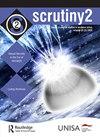诺维奥莱特·布拉瓦约的《我们需要新名字》中的《当旧名字拒绝消失:神话、权力和颠覆》
IF 0.1
0 LITERATURE
Scrutiny2-Issues in English Studies in Southern Africa
Pub Date : 2019-09-02
DOI:10.1080/18125441.2020.1764087
引用次数: 1
摘要
津巴布韦独立后的政治和经济危机仍然是一个充满虚构和非虚构色彩的主题。然而,最近没有一个虚构的表现。。。本文章由计算机程序翻译,如有差异,请以英文原文为准。
When Old Names Refuse to Go: Myths, Power, and Subversion in NoViolet Bulawayo’s We Need New Names
Zimbabwe’s post-independence political and economic crises continue to be a subject of intense fictional and non-fictional representation. However, none of the recent fictional representations has ...
求助全文
通过发布文献求助,成功后即可免费获取论文全文。
去求助
来源期刊
CiteScore
0.50
自引率
0.00%
发文量
10
期刊介绍:
scrutiny2 is a double blind peer-reviewed journal that publishes original manuscripts on theoretical and practical concerns in English literary studies in southern Africa, particularly tertiary education. Uniquely southern African approaches to southern African concerns are sought, although manuscripts of a more general nature will be considered. The journal is aimed at an audience of specialists in English literary studies. While the dominant form of manuscripts published will be the scholarly article, the journal will also publish poetry, as well as other forms of writing such as the essay, review essay, conference report and polemical position piece. This journal is accredited with the South African Department of Higher Education and Training.

 求助内容:
求助内容: 应助结果提醒方式:
应助结果提醒方式:


